Marcia Thornton Jones's Blog, page 23
February 3, 2024
Tuesday 2-Minute Writing Tip #19 "Listening to Intuition"
Hello! This month we are riffing on the word "Listen."
I love this word. So much, that one year (2009!) I chose it as my One Little Word.
As a introverted person who grew up in a chaotic household, I learned very early to listen...to conversations; to news; to other people's opinions and wants and wishes; and to anything that might warn me and keep me safe in the face of upcoming danger.
As a poet, listening is one of my super-powers. So often, as observers of the world, we are called upon to listen.
But the kind of listening I find most challenging, is listening TO MYSELF. As in, listening to intuition.
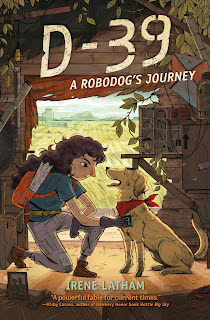 Which probably explains why all three of my middle grade novels are, at their core, about the main character learning to listen to herself.
Which probably explains why all three of my middle grade novels are, at their core, about the main character learning to listen to herself.I give you a quote from D-39: A ROBODOG'S JOURNEY, a dystopian wartime adventure about a girl trying to save a robodog, a neighbor boy, and herself:
"As we walk away from Everlake, I hear a
voice. Yes, Go home. Not Mama's voice. Not
Papa's or anyone else's.
Mine."
...and here is a video from 2-MINUTE WRITING TIP series on YouTube about this very thing. Enjoy!
February 2, 2024
Listening to Your Characters
Listening to Your Characters
When I’m stuck and have no idea where my work in progress isgoing, I take my character and decide on someone else they should talk to, andI lock them in a room and tell them to have at it. And, at least on good days,they do.
Dialogue is something I’ve always enjoyed writing. I wouldlove to be a poetic writer, someone whose descriptions are beautiful, who makesyou see the river or the mountain or the crumbling façade of the building. Ican struggle with it, and occasionally something comes through. But I feel muchmore comfortable with dialogue.
In my most recent book, a novel for adults called Off to Jointhe Circus, my characters range in age from almost 13 to 80, and I had to besure that the dialogue was age-appropriate. I needed to listen to the variouscharacters to hear what it was that they wanted to say—and how they wanted tosay it. Would a teenager really say that? Would an 80-year-old use thatparticular word?
Another manuscript I’m working on is set in 1952, so I hadto listen to my characters—and read various novels set in that time period—to figureout exactly how these characters would express themselves. When did thisparticular slang become popular? Was that word in use by the early ‘50s?
So as I continued to contemplate writing and listening, Idecided to look up the thoughts of some famous writers.
Ernest Hemingway had this to say: “When people talk listencompletely. Don’t be thinking what you’re going to say. Most people neverlisten. Nor do they observe. You should be able to go into a room and when youcome out know everything that you saw there and not only that. If that roomgave you any feeling you should know exactly what it was that gave you thatfeeling.”
James Baldwin had a different take: “Children have neverbeen very good at listening to their elders, but they have never failed toimitate them.”
Moving further afield, the actress and writer Emma Thompsonsaid this: “Any problem, big or small, within a family, always seems tostart with bad communication. Someone isn't listening.”
Which of course gets back to the heart of it. Someone isn’tlistening. Family problems result. And that’s what makes for good fiction.
--Deborah Kalb
@font-face {font-family:"Cambria Math"; panose-1:2 4 5 3 5 4 6 3 2 4; mso-font-charset:0; mso-generic-font-family:roman; mso-font-pitch:variable; mso-font-signature:-536870145 1107305727 0 0 415 0;}@font-face {font-family:Calibri; panose-1:2 15 5 2 2 2 4 3 2 4; mso-font-charset:0; mso-generic-font-family:swiss; mso-font-pitch:variable; mso-font-signature:-536859905 -1073732485 9 0 511 0;}p.MsoNormal, li.MsoNormal, div.MsoNormal {mso-style-unhide:no; mso-style-qformat:yes; mso-style-parent:""; margin:0in; mso-pagination:widow-orphan; font-size:16.0pt; font-family:"Times New Roman",serif; mso-fareast-font-family:Calibri; mso-fareast-theme-font:minor-latin; mso-font-kerning:1.0pt; mso-ligatures:standardcontextual;}.MsoChpDefault {mso-style-type:export-only; mso-default-props:yes; font-size:16.0pt; mso-ansi-font-size:16.0pt; mso-bidi-font-size:16.0pt; mso-fareast-font-family:Calibri; mso-fareast-theme-font:minor-latin;}div.WordSection1 {page:WordSection1;}
January 29, 2024
Eureka!
by Charlotte Bennardo
Eureka! That's supposedly what the mathematician Archimedes shouted when he discovered how to calculate the mass of gold used in the king's crown (water was displaced in a bathtub as he got in and he applied it to the gold crown). Don't know if the story or the math are true (hey, English person here), but when a writer gets an epiphany, we feel like shouting. And sometimes we do.
I'm not a person that thinks, 'I'd like to write a coming-of-age book', or a 'character-driven contemporary novel'. I don't ponder issues and dilemmas or even characters. Usually my ideas come with an epiphany, like a slap across the back of my head. Some examples:
My youngest son was playing in the sandbox while his brothers were at school. We had a resident squirrel in the big backyard tree that I would put out bananas, nuts, and other fruits for. This squirrel was a character, brave enough to come relatively close while kiddo and I were out there. Collin's brother Alec, in third grade, came home, whining about homework. The paper he showed me had to deal with simple machines: lever, wedge, wheel, etc. I promised to help him. Several days later, I was checking on my squirrel, thinking about Alec's assignment. I thought it would be so cool if the squirrel learned 'simple' machines. WHAM! BOOK IDEA! - my Evolution Revolution trilogy.
 Photo by Ludovic Delot: https://www.pexels.com/photo/close-up...
Photo by Ludovic Delot: https://www.pexels.com/photo/close-up...There is a renaissance fair in Tuxedo Junction, NY, every fall. While perusing the stalls of various crafts people, I stopped at the blacksmith's. It was fascinating to watch him hammer orange-hot metal into a knife. Random thoughts run unfettered in my brain constantly, and I thought about how blacksmithing looks the same as I'd imagine it hundreds of years ago. A man in a knight's costume, with a long sword, walked by. Reminded me of the King Arthur tales. WHAM! What about a blacksmith who ruins the greatest sword ever made, Excalibur! Its magic would create a repercussion. BOOK IDEA! - my thesis novel, The Excalibur Vow.
 Photo by Rene Asmussen: https://www.pexels.com/photo/man-hold...
Photo by Rene Asmussen: https://www.pexels.com/photo/man-hold...
These are just two examples how random thoughts that flow through and I don't pay much attention to suddenly link up with a partner and suddenly I have a new book idea. I never need books on how to find inspiration and I can't deal with some authors' complex systems of writing down ideas and scenarios until I find one that works.
Now, I don't use all my epiphanies (would that I could live that long!), so I make notes and keep them in an idea file. Sometimes I revisit those ideas and use them in short stories, or as novel starters. I firmly believe that when you have an epiphany, you shouldn't ignore it- it's a gift from your muse and she doesn't always answer your calls.
Until next month-
Char
Charlotte writes MG, YA, NA, and adult novels in sci fi, fantasy, contemporary, and paranormal genres. She is the author of the award-winning middle grade Evolution Revolution trilogy, Simple Machines, Simple Plans, and Simple Lessons. She co-authored the YA novels Blonde OPS, Sirenz, and Sirenz Back in Fashion. She has two short stories in the Beware the Little White Rabbit (Alice through the Wormhole) and Scare Me to Sleep (Faces in the Wood) anthologies. Having finished her MFA, she's applying what she learned and is working on several children's and adult novels, along with some short stories. She lives in NJ with her family and her floofy cat. When they trimmed the backyard tree, the crazy squirrel couple had to move out.
January 25, 2024
Luck, Christmas Trees, and Epiphany (Holly Schindler)
I am a firm believer that Christmas trees come down on the 26th. I'm a little looser about when they go up. I usually put them up on Thanksgiving weekend, but they might also go up a little earlier, depending on my Thanksgiving plans.
But I am adamant about coming down--they come down on the 26th. If the weather is decent, the outdoor decorations come down on the 26th too.

Apparently, there's a superstition that you're supposed to take the tree down on Epiphany--January 6. Taking them down earlier will bring on a year of bad luck.
Sometimes, I think writers are worse than athletes about superstitions. We don't submit before the holidays. Back in the days of paper subs, we used to put lucky stamps on SASEs. We don't send manuscripts after four p.m. Or we only submit on Mondays. Or we submit wearing lucky socks.
But the thing is, there's only one thing that creates luck--and it isn't socks and it isn't a day of the week and it isn't a number. It's showing up. Every day. Even when things aren't going well. Even if part of you wonders if anything you do matters anymore.
Here's the truth: It does matter. It matters even more when you've been beaten up and you wonder if it's worth it.
I have a quote from Emily Dickinson above my desk. It's been there since I started writing full time in '01. It says:
"Luck is not chance—
It's Toil—
Fortune's expensive smile
Is earned"
I still believe it, all these years later.
And next year, my tree will come down before Epiphany.
~
Holly Schindler is the author of the MG The Junction of Sunshine and Lucky
January 23, 2024
How to Write an Epiphany: Smack Dab in the Imagination by Dia Calhoun
For me, the question isn't how to communicate your character's actual epiphany—some sudden insight wisdom, or revelation. Thestatement of that can be straightforward enough. No, the haunting question ishow does a writer communicate the experience—the state of mind, psyche, emotion, somaticfeeling—that leads to the character’s epiphany? That's what makes the epiphany believable. This is tricky because that experience is often fundamentally a liminal state of psychicdisorientation, and you don’t want to disorient the reader or have your writingfeel over the top. So how do you do it?
Structure.
That seems counter-intuitive, right? To structure an experience that falls somewhere between an ah-hamoment at the low end or a profound revelation at the high end. But if you lookat initiation experiences, which are similarly about disorientation that leadsto revelation, you’ll see they are all about structure.
Here are a few suggestions gleaned from my study of the problem.
--Start in the character's very ordinary, very grounded kitchen-table-world.
--Have something or someone, be a bridge into the liminalworld.
--Have the character feel several contradictory physical sensations—theold hot and cold idea. Or up is down or down is up. This starts to dissolve the ordinary world. The characteris in a chaotic spin. Build this moment.
--State the epiphany.
--Return to the ordinary world and integrate theexperience.
Practice this technique by writing up scenarios. I'm telling you; this reallyworks. Have fun.
January 15, 2024
On Epiphanies, Eurekas and other Mavities
This week we explore the meaning of epiphany as it relatesto our work and life. We understand that the term, as it applies to the ordinary, is anexperience of a sudden and striking realization. Ina flash, the moment turns away from the ordinary and enters the extraordinary.
It is Archimedes' realization of how to estimate the volumeof a given mass, when he shouted "Eureka!" ("I have foundit!")
Or, when struggling to reconcile Newtonian physics andMaxwell's equations, Einstein took a streetcar home. Looking behind him at thereceding clocktower, he realized that if the car sped up (close to the speed oflight) he would see the clock slow down, and remarked, "a storm brokeloose in my mind.”
Or, the moment when Isaac Newton gets hit with a falling apple. It's Mavity! (It's a Doctor Who thing. But still the same definition of epiphany made).
It’s the a-ha moment, when ordinary becomes extraordinary, when suddenly we come to an understandingof a previously incomprehensible problem or concept.
Writers strive for those a-ha moments as weengineer our stories, when suddenly the character and their journey make sense.We struggle in our efforts to give readers their own epiphanies via relatablecharacters and fantastic adventures. Writer’s block by any other name stillstinks. But I’m not going to discuss this here because it seems just as important toremember that’s it’s okay to not have an epiphany. Not everything needs to beextraordinary all the time. Sometimes, as Tolkien once said, it’s not a bad thing tocelebrate the simple life every so often.
Now is the time when writers make their resolutions to write XX number ofpages a week, or contact XX number of agents, or submit XX number ofmanuscripts. And spend XX number of hours on research, write an outline, chart a character arc. Revise XX number of chapters. Write a forward.
Here’s an epiphany I posted last year. Wisdom from Emma Dryden. It should be postedevery New Year as we struggle to achieve these preposterous resolutions. It’sokay to be human, and ordinary, at least for a day or two anyway.
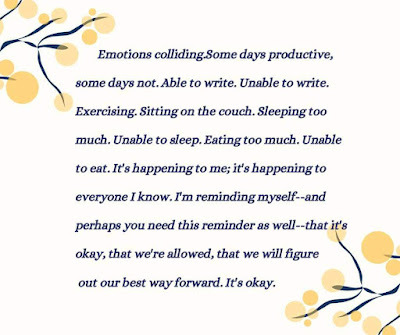
January 14, 2024
The Elusive Writing Epiphany
The Elusive Writing Epiphany
As a writer, I definitely have days when I’m sloggingthrough, trying to get to my word count for the day and hoping for somethingexciting that will keep me—and my potential future readers—eager to continue.
Then there are days when my characters enjoy talking to oneanother, and something emerges that I hadn’t quite expected. And that’sexciting! Encouraging! I feel better about the world, or at least my smallcorner of it.
But every so often, alchemy occurs. My characters takeactions that throw my whole plot up in the air. Actions I certainly hadn’tpredicted. And all I can do is sit back and take a deep breath.
Take my character Lucy, in my new novel for adults, Off toJoin the Circus. Lucy, a 35-year-old middle school English teacher and theyoungest of three daughters in a close-knit family, recently went through adivorce.
Both Lucy and I firmly believed that Lucy and her formerhusband, Jeff, went their separate ways because they couldn’t agree abouthaving children. Lucy wanted a child; Jeff did not. Their divorce was fairlyamicable.
But one day, Lucy and I had a sudden realization about Jeff andtheir marriage (I won’t get into it, in case anyone wants to read Off to Jointhe Circus) that caused us to rethink absolutely everything. I was stunned—as,of course, was Lucy.
The elusive writing epiphany. It appears when you leastexpect it. So here’s to more writing epiphanies in 2024, for us all.
--Deborah Kalb
@font-face {font-family:"Cambria Math"; panose-1:2 4 5 3 5 4 6 3 2 4; mso-font-charset:0; mso-generic-font-family:roman; mso-font-pitch:variable; mso-font-signature:-536870145 1107305727 0 0 415 0;}@font-face {font-family:Calibri; panose-1:2 15 5 2 2 2 4 3 2 4; mso-font-charset:0; mso-generic-font-family:swiss; mso-font-pitch:variable; mso-font-signature:-536859905 -1073732485 9 0 511 0;}p.MsoNormal, li.MsoNormal, div.MsoNormal {mso-style-unhide:no; mso-style-qformat:yes; mso-style-parent:""; margin:0in; mso-pagination:widow-orphan; font-size:16.0pt; font-family:"Times New Roman",serif; mso-fareast-font-family:Calibri; mso-fareast-theme-font:minor-latin; mso-font-kerning:1.0pt; mso-ligatures:standardcontextual;}.MsoChpDefault {mso-style-type:export-only; mso-default-props:yes; font-size:16.0pt; mso-ansi-font-size:16.0pt; mso-bidi-font-size:16.0pt; mso-fareast-font-family:Calibri; mso-fareast-theme-font:minor-latin;}div.WordSection1 {page:WordSection1;}
January 12, 2024
MY MIDDLE GRADE BOOK REVIEWS FOR 2023 by Darlene Beck Jacobson
Each year I read a lot of kid lit books. Just as I'm sure many of you do. I also try to leave reviews for the books I love. There were so many wonderful middle grade stories in 2023. Here are the ones I read and really enjoyed.
MIRROR TO MIRROR (MG) by Rajani LaRocca
SPIRIT’S KEY (MG) by Edith Cohn
THE CARREFOUR CURSE (MG) by Dianne K Salerni
THE GRAY (MG) by Chris Baron
THE BOY, THE BOAT, AND THE BEAST (MG) by Samantha M Clark
THE OGRESS AND THE ORPHANS (MG) by Kelly Barnhill
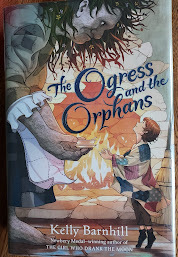
HUMMINGBIRD (MG) by Natalie Lloyd
THE SWIFTS (MG) by Beth Lincoln
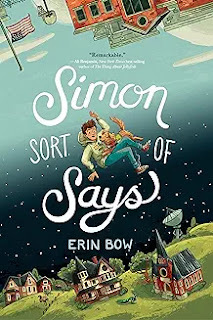
DUST (MG) by Dusti Bowling
WILD ROBOT PROTECTS (MG) by Peter Brown
PHARMACY GIRL (MG) by Kate Szegda
THE LAST GRAND ADVENTURE (MG) by Rebecca Behrens
SIMON SORT OF SAYS (MG) by Erin Bow
I hope you'll check out some ot the titles. I am looking forward to more great reading in 2024 and make a resolution to post reviews for the books I love. As authors we feel good when we get some book love in the form of positive reviews. Here's to great middle grade books and happy reading in 2024!
Darlene Beck Jacobson is already reading a great new MG book she will be sharing soon. Happy New Year!!
January 11, 2024
Reveal Yourself!


The last of the Merriam-Webster definitions of epiphany...that’s the one!Because...How great is it when you reach that twist, that turn, that aha moment in a book or a movie! How great it is when you didn’t see it coming! How great is it when you had no clue how the writer would weave all those pieces together in one cohesive, satisfying conclusion.
There was one book when it didn’t happen for me.
I was in 4th grade when our teacher handed out the seasonal Scholastic Book Club flyer.
Me! I could choose whichever books I wanted. My shortlist must’ve included a dozen titles or more but the budget would allow only three.
One book, in particular, was a slam dunk. The main character had a big secret. What was it? What was it? What? Was? It!?
When the books finally arrived, I tore into that story immediately. And when I got to The End, I sat there, stunned.Not surprised-stunned.
Disappointed-stunned.
The MC’s secret may have been a big deal to her, but it was a who-cares to me.
I still remember the book’s cover. I remember its title. What I don’t remember are the particulars of the character and the plot. I suppose I chose to forget them.
What I’ve never forgotten is this:
My readers deserve an ending they can sink their teeth into.
Easier said than done.
Even after I’ve carefully crafted plot and characters, after I’ve imagined scenes that are rich with detail, after I’ve promised my readers they'll come away with that feeling of satisfaction, I’ve sat there. Wracking my brain. Searching for that spark, that aha-moment which remains buried deep in those tens of thousand of words.
It's at this point, I should sit back and take a deep breath. I really should. But that 4th grader's voice bubbles up, loud and clear. “Hey Reveal, pretty please, REVEAL YOURSELF. NOW!”
Jody Feldman refuses to show anyone her work before she’s certain it has the payoff she expected from that book she read so long ago.
January 8, 2024
EPIPHANY? by Jane Kelley
Where do you get your ideas? That's the question I always get when I do workshops. That's also the question I ask myself when I get stuck for one.
The myth, of course, is that ideas come like this.
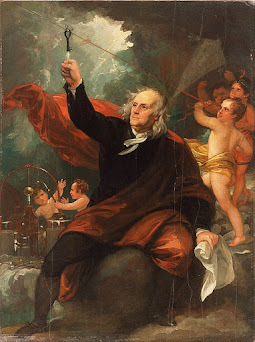 Benjamin Franklin Drawing Electricity from the Sky -- by Benjamin West Ideas come from some place above. You can call it a muse, or divine inspiration. I remember being taught that Benjamin Franklin discovered electricity by flying a kite in a thunder storm. I'm sure those weren't the facts I was presented with. But that's what stuck in my head. Look at Benjamin West's painting of Franklin out in a thunder storm with his kite! If that isn't an epiphany, then what is? He's like Prometheus stealing energy from the gods. He's surrounded by cherubs, for Pete's sake. He's doing something glorious! Because, as we all know, electric current traveled down his kite string so he could tame it for the benefit of all humankind.
Benjamin Franklin Drawing Electricity from the Sky -- by Benjamin West Ideas come from some place above. You can call it a muse, or divine inspiration. I remember being taught that Benjamin Franklin discovered electricity by flying a kite in a thunder storm. I'm sure those weren't the facts I was presented with. But that's what stuck in my head. Look at Benjamin West's painting of Franklin out in a thunder storm with his kite! If that isn't an epiphany, then what is? He's like Prometheus stealing energy from the gods. He's surrounded by cherubs, for Pete's sake. He's doing something glorious! Because, as we all know, electric current traveled down his kite string so he could tame it for the benefit of all humankind. At least, that's the myth. The truth is a much more complicated, as truth usually is. This moment in the storm was not a stroke of genius. This was a scientific experiment. Franklin knew that another scientist, Jean-Antoine Nollet, had wondered if lightning was connected to electricity in 1749. Others were studying tribolic electric effect -- where charges can pass from one object to another. Franklin had tried to make that transfer from the top of a tall building. All of which was very interesting to scientists, but I know you're wondering -- what about that kite?
Franklin and his son attached two strings to the kite. One was wet to conduct the electricity to a Leyden jar -- a contraption made of several nesting jars used to store electricity. The other string was kept dry so that Franklin could safely hang on to the kite without getting killed like Georg Wilhelm Richmann, another scientist who was also working with electricity.
In fact, on that fateful day, no lightning bolt struck the kite. The wet string did conduct an electrical charge. Franklin observed the tiny filaments of the string stand up -- like static -- as the power was conducted down the string to the Leyden jar. After energy was in that jar, Franklin used it later to, as he described, charge phials, kindle spirits, and perform all other electrical experiments that people did with "excited" globes and tubes.
In other words, the kite experiment worked. Just not in the way that Benjamin West depicted in his painting.
And so it must be for us humble creators. We should not wait for lightning to strike us. If it did, it probably would kill us, like poor Georg Wilhelm Richmann, who never was glorified in a painting for his work with electricity. Instead we should construct a place to keep our ideas safe until we are ready to use them.
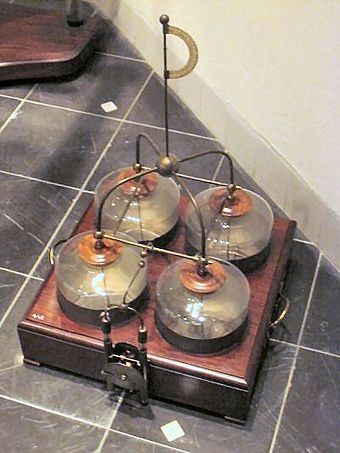
If you don't like these Leyden jars, maybe a notebook will suffice. JANE KELLEY -- has never been struck by lightning, but she has flown kites and is the author of many middle grade novels.



